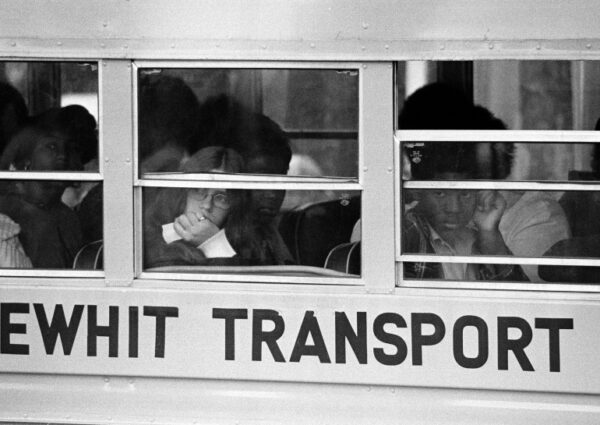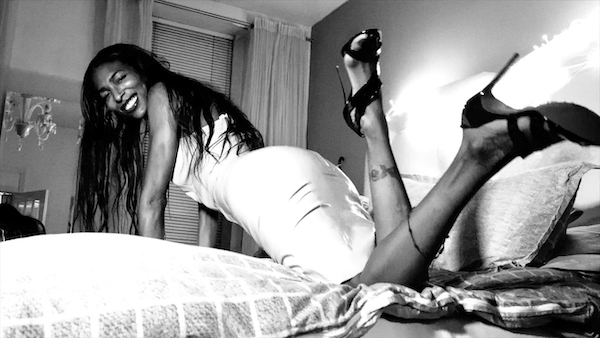Film Festival Review Round-Up: Provincetown 2023
By Gerald Peary
I could sense a bit of the downfall of indie narrative cinema at last week’s 25th Provincetown Film Festival, but luckily the spirited programmers dug deeper and worked harder to locate worthwhile cinema.

A scene from The Busing Battleground. Photo: Provincetown Film Fest
It’s a dispiriting time for American independent features, as distributors are wary of purchasing any of them because they mostly collapse at the box office. And here’s an ugly truth: they just aren’t as good or as inventive as they used to be. Where are today’s Tarantino, Jim Jarmusch, John Waters, Martha Coolidge, Susan Seidelman, Allison Anders? Where is there an inspiring, talented, unorthodox movement like the Mumblecore crowd of a decade ago?
I could sense a bit of the downfall of indie narrative cinema at last week’s 25th Provincetown Film Festival. Despite the best intentions of the programmers, they couldn’t get past the fact that they had depleted choices, including what was offered to them this year from Sundance. Did Theater Camp, a woefully thin and unfunny comedy, actually win awards in Park City? And Earth Mama, an astoundingly dreary downer about Black life in America: was it actually celebrated at Sundance? And what about Ira Sachs’s Passages, an unpleasant saga about an off-putting gay man in France who suddenly goes hetero, with the most dubious scene of 2023: a closeup on two butts at work during a heated, extended bout of anal sex?
Sorry, I just broke all mannerly rules by starting with the worst. But luckily the spirited P-Town Fest dug deeper and worked harder to locate worthwhile cinema. Attendees were well rewarded with some fine features and, the biggest excitement, some extraordinarily potent documentaries.
Let’s begin with praise and gratitude for The Busing Battleground from Brookline’s Sharon Grimberg and New York’s Cyndee Readden. As Grimberg explained in a Q&A, this American Experience film (it will be televised in September) began when her teenage son was assigned in school the standard text on the 1970s Boston busing crisis, J. Anthony Lukas’s 1985 Common Ground: A Turbulent Decade in the Lives if Three American Families. Grimberg read the Pulitzer Prize winner, disappointed that it was mostly from a white perspective. How about a reappraisal more than 35 years after Lukas’s book was declared the definitive word? In response to Lukas, Grimberg and her African-American co-filmmaker Readden have produced a courageous, ideologically unexpected revisionist view of what happened in Boston, beginning with opening up the story to the important perspective of Roxbury’s Black community.
What I read as the filmmakers’ daring conclusion: busing was wrong, busing didn’t work at all, even with the best intentions for an integrated Boston. Nobody Black or white wanted to be bused, and especially when it meant being transported to a school in Roxbury or South Boston which was just as impoverished, crowded, underfunded as the one you left. Plus the astoundingly ugly violence and racial hatred, the threats to innocent youngsters, the shocking realization that there was, alas, little difference between Massachusetts and Mississippi. Grimberg and Readden’s sad conclusion: what was needed, and is still needed, isn’t busing but an immense explosion of federal funding to schools in poorer neighborhoods. That will never happen in our selfish, conservative America.
A confession: I’m a typical guy who turned his nose up at so-called “women’s music.” Seeing Alexandra Bombach’s amazingly winning It’s Only Life After All, I understand for the first time why my wife, Amy, has been so enamored of the Indigo Girls, why she has adored them since college. This frank, up-close portrait of the harmonizing twosome, Amy Ray and Emily Saliers, gives us two splendid hours with these smart, thoughtful, truthful, charismatic women who dared to declare their lesbian identities when few were so brave in the ’80s. They remain open as they look back on their lives: Emily talks about her once-fearsome alcoholism; Amy admits to embarrassment that some of her earlier songs are so earnest and pretentious. Anyway, I now love the Indigos dearly after spending intimate time with them on screen. And their music? It’s, well, not bad.

Dominique Silver appears in Kokomo City. Photo: D. Smith
Another confession: one can feel drowned in the flood of “trans” films, documentary and fiction, suddenly coming down the pike. How many stories can there be? Probably none as forthright, raw, and X-rated honest as D. Smith’s Kokomo City. This documentary is a first, a nonjudgmental peek at “trans” hookers and their johns; and there is absolutely nothing in their transgressive lives that they are not willing to share with Smith, who shoots all in a fittingly hip, hand-held camera, expressionist style. No, you have never before heard “trans” prostitutes describing, so matter-of-factly, how their bodies are used by their variety of customers, from supposedly cis men wanting oral sex only, not looking below, to bisexuals obsessed with the still-remaining male anatomy.
Finally, let me quickly praise some of the narrative films shown in 2023 at Provincetown. Who couldn’t be moved by Andrew Durham’s Fairyland, a story of a young girl brought up in ’70s San Francisco by a gay father who contracted AIDs? It’s based on a memoir by Alysia Abbott, who was in attendance in P-Town and now resides in Boston. She clearly approves of the work, the brilliant casting of Emilia Jones and Scoot McNairy as daughter and father, and the sensitive direction by first-timer Andrew Durham.

Megan Stalter in Hannah Pearl Utt’s Cora Bora. Photo: Provincetown Film Fest
Corey Sherman’s Big Boys is a very sweet tale of the coming out of a 14-year-old boy. Its greatest strength is the very simple, straightforward way the story is told, showcasing the excellent, sympathetic ensemble of young actors. Patricia Ortega’s Mamacruz is an enjoyable film from Spain about an elderly church-going lady with a dead sensual life and a comatose husband. She finds herself upon joining an all-woman sex education group. Finally, Provincetown had a rousing opening night film with Hannah Pearl Utt’s Cora Bora. It stars Hacks’ appealing Megan Stalter as a funny, hopelessly obnoxious lesbian who leaves her San Fran lover for a singing career in L.A. She then changes her mind and wants her girlfriend back, but in the meantime the ex has fallen hard for a new, more straitlaced woman. Oh, the duplicitous ways Stalter tries to get her old flame back — it is screwball comedy with a rowdy dike twist.
I talked briefly to the large-bodied actress and asked her if she had thought of John Waters’s Divine in creating her swaggering, wildly dressed, spiteful role. “I LOVE Divine,” Stalter told me. “It makes me so happy that you see the resemblance.”
Gerald Peary is a Professor Emeritus at Suffolk University, Boston; ex-curator of the Boston University Cinematheque; and the general editor of the “Conversations with Filmmakers” series from the University Press of Mississippi. A critic for the late Boston Phoenix, he is the author of nine books on cinema; writer-director of the documentaries For the Love of Movies: The Story of American Film Criticism and Archie’s Betty; and a featured actor in the 2013 independent narrative Computer Chess. His latest feature documentary, The Rabbi Goes West, co-directed by Amy Geller, has played at film festivals around the world.
Tagged: Alexandra Bombach, Andrew Durham’, Cora Bora, Cyndee Readden, Fairyland, Hannah Pearl Utt, It’s Only Life After All, KOKOMO CITY, Sharon Grimberg

Your pieces about the p-town fest are always first rate!